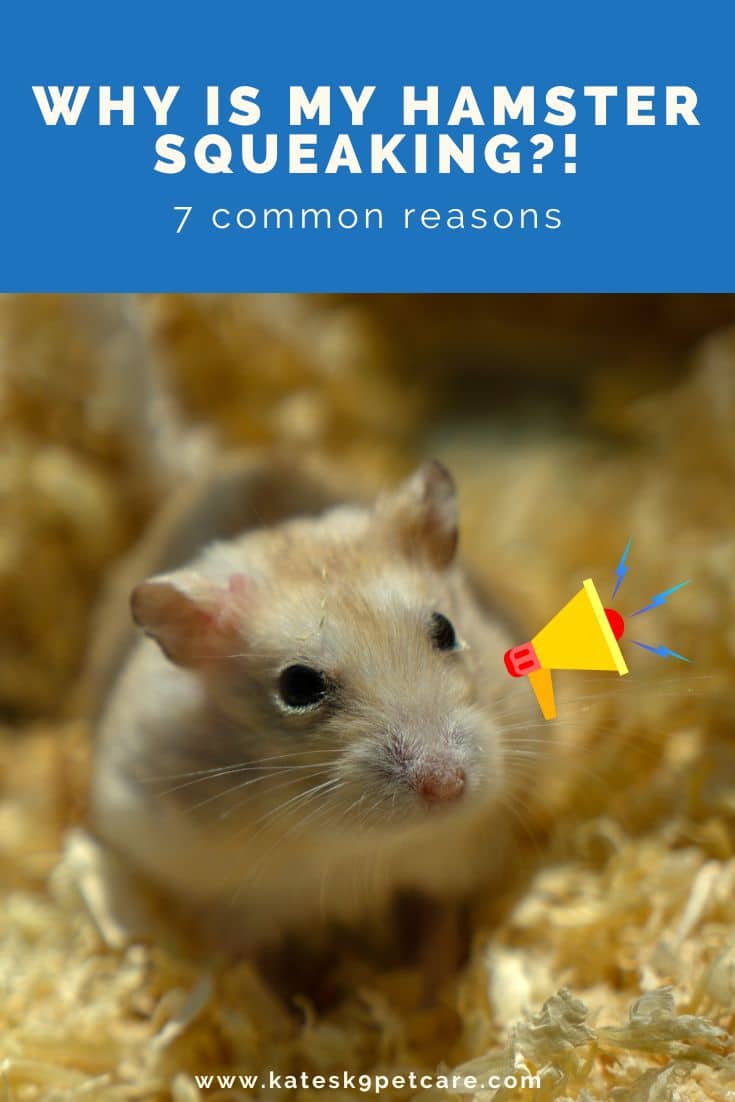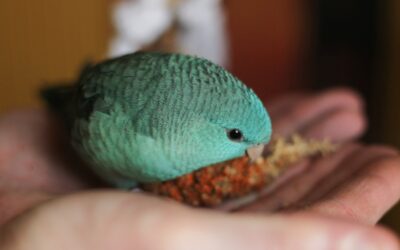If you’re a first-time hamster keeper, the various little sounds and behaviors of your new furry friend can be puzzling. They’re so different from cats and dogs! Even seasoned hamster owners are left stumped sometimes. Today: why is my hamster squeaking?! If your hammie is running around making sounds like a rubber duck, there can be a bunch of different reasons, both good and bad.
Below, let’s go into different reasons for hamsters to squeak and whether they’re a problem or not. After all, your pet is likely trying to communicate something to you, so it’s important to learn to understand its language! Don’t worry, you’ll get a feel for what it needs from you soon enough.
Why is my hamster squeaking? | 7 common reasons
Happy hamster
Let’s start off on a positive note. Although it’s not very common, a happy and content hamster can produce a low-pitched squeaking or chirping noise. If your hammie is happily digging through its cage bedding, you just gave it its favorite treat, or you let it out of its cage to explore in a space where it feels comfortable, you may be rewarded with happy squeaks. Sometimes even a good stretch or yawn is enough to warrant a squeak.
The takeaway here is: keep doing what you’re doing! For example, if your hamster is contentedly chirping away in a new tube toy, you may consider providing more of these.
Scared hamster
Unfortunately, a hamster producing a squeaking noise isn’t always something positive. High-pitched squeaks, often continuous, can be an indication that your furry friend is afraid of something. Remember, hamsters are prey animals, and they’re particularly nervous beings. Something that seems completely normal to you may make a hamster feel like it’s in danger. This stress is sometimes vocalized in the form of squeaking sounds.
If your hamster starts squeaking, ask yourself whether one of the following applies. If so, try to remove the stressor.
- You’re trying to handle a hamster that isn’t tame, so it’s scared of your hands. With very skittish hamsters, even just walking by their cage can be enough
- A larger pet, like a dog, is too close to your hamster
- You just brought your hamster home and it’s not used to its new environment yet
- Your hamster is also shaking. This is a dead giveaway that it’s not comfortable
- Something is making a loud noise or casting a shadow over the cage
- You introduced a new toy or another object (this can also elicit happy squeaks – it depends on how comfortable your hamster is with new things)
Annoyed hamster
Ever woken up a hamster during the day? Chances are, you got squeaked at! These rodents can get vocal if they’re not happy about something. The same can happen if you take away your hammie’s food or a toy, if you lift it too high (they don’t like heights, so stay close to the ground), if you try to trim its nails, or if you do anything else to inconvenience it.

Hamster needs something
It does seem that our hamsters quickly learn that squeaking gets a reaction out of you. As they unfortunately haven’t learned to speak English (how convenient would that be?!), some will squeak to let their owners know they’re hungry or thirsty. They may also do it if they want out of their cage, if they want attention, or if (part of) their cage is particularly dirty.
So if you hear squeaking and you don’t see anything that might have scared or excited your hammie, just quickly go over all the essential components (food, water, hygiene) to make sure it’s all clean and in order. If it is, try seeing if your hamster wants to explore or hang out.
Hamster is in pain
Hamsters may squeak if they’re not feeling well, especially in reaction to an injury or to getting stuck somewhere. You’d squeak too if you got your toe caught on something, cut yourself, or similar! If you hear sudden, frantic squeaking, especially combined with thrashing sounds, you need to drop whatever you’re doing to check whether your hamster needs help.
If your hamster is squeaking regularly, you should add a body check-up to the list of things to check to make sure it’s okay. This especially applies if your hamster is also hiding, shaking, or otherwise acting odd.
Hamster communication
If you own multiple hamsters, especially if they’re still young, you’ll probably hear plenty of squeaking and chirping. Hamsters use sound to communicate when they’re happy to see each other or want to play. They also squeak when they want to alert the others of danger or if one of their “pack” does something they don’t appreciate.
If your hamsters get into a territorial squabble, squeaking is bound to happen. They don’t just squeak when they get hurt, but also do so to convey their (perceived) dominance over their opponent.
Respiratory issues
This one’s not exactly what we mean by squeaking, a sound your hamster makes voluntarily to express (dis)satisfaction, but it’s still important. If your furry friend has a cold or is breathing in dust from inappropriate bedding or bathing sand, it can start making a sort of squeaky wheezing sound as it breathes. This should be easy enough to tell apart from other types of squeaking, as it’s constant and involuntary.
If you hear your hamster producing wheezy squeaks, a vet visit is in order. You should book it in ASAP, as these problems can progress to something serious in unlucky cases.
Did you know? Squeaks aren’t the only sounds a hamster can make. They produce a bunch of other vocalizations, but we can’t hear all of them! Scientists have found, for example, that male hamsters produce ultrasonic sounds when they’re getting frisky. Baby hamsters may also produce noises that are too high-pitched for us to hear.
What does a squeaking hamster sound like?
Because hamsters can squeak for different reasons, it can be difficult to figure out what exactly is going on with yours. Is this a happy squeak or a scared squeak?! As mentioned, the sounds do vary slightly. Generally speaking, a happy hamster squeak is low in pitch, like a chirp.
The two videos below are excellent examples of happy hamster squeaks (video 1; turn the sound up, as these are generally not as loud) and scared/annoyed hamster squeaks (much louder and higher in pitch). Although both hamsters are in similar situations, outside their cage, one of them is clearly comfortable with its surroundings and the other one isn’t. A good reminder that what works for one animal doesn’t necessarily work for all of them!
Conclusion: Why is my hamster squeaking?
Although hamsters are generally among the most silent pets, they do occasionally make some noise. If you’re scratching your head wondering “why is my hamster squeaking all of a sudden?!”, it’s important to know that it’s trying to communicate something. The reason can depend on context. Happy hamsters do squeak, but you should also check if anything is wrong:
- Something scary going on?
- Cage, food and water in order?
- Hamster in order?
The little noises your hammie produces can be confusing at first, but don’t worry: as you get to know each other, you’ll get a better feel for what each of them means.







